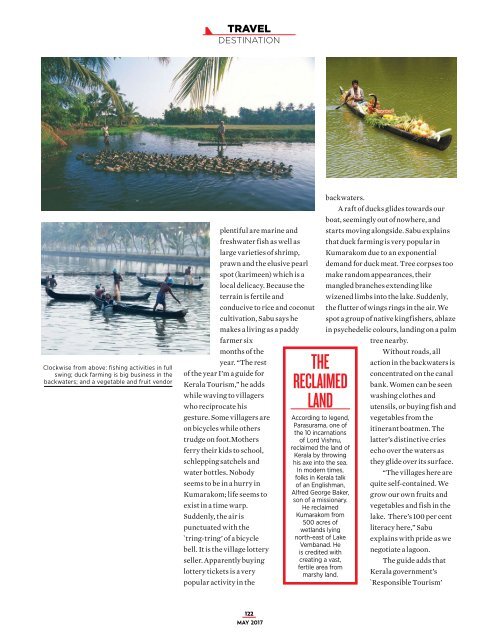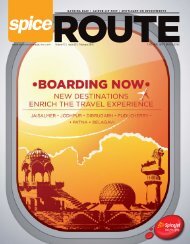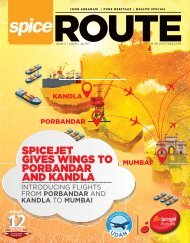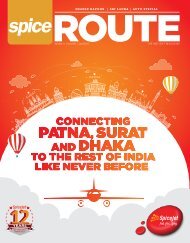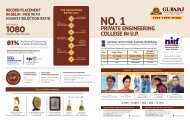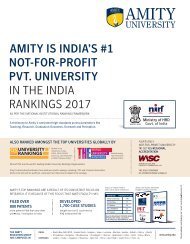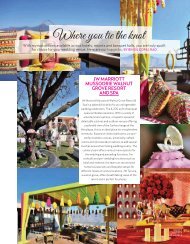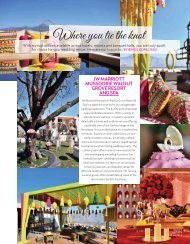Spice May issue ipad LR
You also want an ePaper? Increase the reach of your titles
YUMPU automatically turns print PDFs into web optimized ePapers that Google loves.
TRAVEL<br />
DESTINATION<br />
Clockwise from above: fishing activities in full<br />
swing; duck farming is big business in the<br />
backwaters; and a vegetable and fruit vendor<br />
plentiful are marine and<br />
freshwater fish as well as<br />
large varieties of shrimp,<br />
prawn and the elusive pearl<br />
spot (karimeen) which is a<br />
local delicacy. Because the<br />
terrain is fertile and<br />
conducive to rice and coconut<br />
cultivation, Sabu says he<br />
makes a living as a paddy<br />
farmer six<br />
months of the<br />
year. “The rest<br />
of the year I’m a guide for<br />
Kerala Tourism,” he adds<br />
while waving to villagers<br />
who reciprocate his<br />
gesture. Some villagers are<br />
on bicycles while others<br />
trudge on foot.Mothers<br />
ferry their kids to school,<br />
schlepping satchels and<br />
water bottles. Nobody<br />
seems to be in a hurry in<br />
Kumarakom; life seems to<br />
exist in a time warp.<br />
Suddenly, the air is<br />
punctuated with the<br />
`tring-tring’ of a bicycle<br />
bell. It is the village lottery<br />
seller. Apparently buying<br />
lottery tickets is a very<br />
popular activity in the<br />
THE<br />
RECLAIMED<br />
LAND<br />
According to legend,<br />
Parasurama, one of<br />
the 10 incarnations<br />
of Lord Vishnu,<br />
reclaimed the land of<br />
Kerala by throwing<br />
his axe into the sea.<br />
In modern times,<br />
folks in Kerala talk<br />
of an Englishman,<br />
Alfred George Baker,<br />
son of a missionary.<br />
He reclaimed<br />
Kumarakom from<br />
500 acres of<br />
wetlands lying<br />
north-east of Lake<br />
Vembanad. He<br />
is credited with<br />
creating a vast,<br />
fertile area from<br />
marshy land.<br />
backwaters.<br />
A raft of ducks glides towards our<br />
boat, seemingly out of nowhere, and<br />
starts moving alongside. Sabu explains<br />
that duck farming is very popular in<br />
Kumarakom due to an exponential<br />
demand for duck meat. Tree corpses too<br />
make random appearances, their<br />
mangled branches extending like<br />
wizened limbs into the lake. Suddenly,<br />
the flutter of wings rings in the air. We<br />
spot a group of native kingfishers, ablaze<br />
in psychedelic colours, landing on a palm<br />
tree nearby.<br />
Without roads, all<br />
action in the backwaters is<br />
concentrated on the canal<br />
bank. Women can be seen<br />
washing clothes and<br />
utensils, or buying fish and<br />
vegetables from the<br />
itinerant boatmen. The<br />
latter’s distinctive cries<br />
echo over the waters as<br />
they glide over its surface.<br />
“The villages here are<br />
quite self-contained. We<br />
grow our own fruits and<br />
vegetables and fish in the<br />
lake. There’s 100 per cent<br />
literacy here,” Sabu<br />
explains with pride as we<br />
negotiate a lagoon.<br />
The guide adds that<br />
Kerala government’s<br />
`Responsible Tourism’<br />
122<br />
MAY 2017


